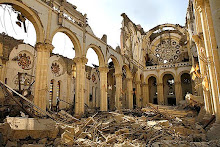 Jeremiah 1. 4-5, 17-19; Psalm 71. 1-6, 15-17; 1 Corinthians 12:31--13:13; St. Luke 4. 21-30
Jeremiah 1. 4-5, 17-19; Psalm 71. 1-6, 15-17; 1 Corinthians 12:31--13:13; St. Luke 4. 21-30
In the town of Nazareth, where so many knew the Lord well, saw him grow, visited his home, a sin had taken root; familiarity had bred a prideful sense of entitlement. Those who knew the Lord well, "Is not this Joseph's son?" (Lk 4, 22) assumed that he would grant them the signs and miracles of which they had heard so much in other cities and towns. This pride left them receptive to the Lord and his teaching at a merely superficial level, and their pleasure and approval quickly turned to murderous hatred when he reproved them for their sin, "When they heard this, all in the synagogue were filled with wrath. And they rose up and put him out of the city, and led him to the brow of the hill on which their city was built, that they might throw him down headlong." (Lk 4, 28-29) Their pride, a sin against love, had grown into a monstrous hatred.
One can sin against God's love in various ways: |
In their hatred for Christ, the Nazarenes committed grave sin. In their overweening pride, hatred became a deliberate attack against Jesus, for they intended to kill him.
Deliberate hatred is contrary to charity. Hatred of the neighbor is a sin when one deliberately wishes him evil. Hatred of the neighbor is a grave sin when one deliberately desires him grave harm. "But I say to you, Love your enemies and pray for those who persecute you, so that you may be sons of your Father in heaven." (Mt 5: 44-45)(CCC 2303) |
The Lord majestically frees himself from their grasp, "But passing through the midst of them he went away." (Lk 4, 30) Christ is the peacemaker, and our model as bearers of peace. We must pray for peace and, through active charity, extend the gift of peace and forgiveness to all. Some, in pursuing Christian perfection, may even choose to renounce violent resistance and, instead "make use of those means of defense available to the weakest" (CCC 2306) when confronting their enemies. Christ embraced solidarity with the weakest, for he merely fled from his persecutors, rather than summoning his manly or divine strength in his own defense.
Those who renounce violence and bloodshed and, in order to safeguard human rights, make use of those means of defense available to the weakest, bear witness to evangelical charity, provided they do so without harming the rights and obligations of other men and societies. They bear legitimate witness to the gravity of the physical and moral risks of recourse to violence, with all its destruction and death. (Cf. GS 78, 5.) (CCC 2306) |
Let's pray for each other until, together next week, we "meet Christ in the liturgy", Father Cusick
Meeting Christ in the Liturgy (Publish with permission.)














